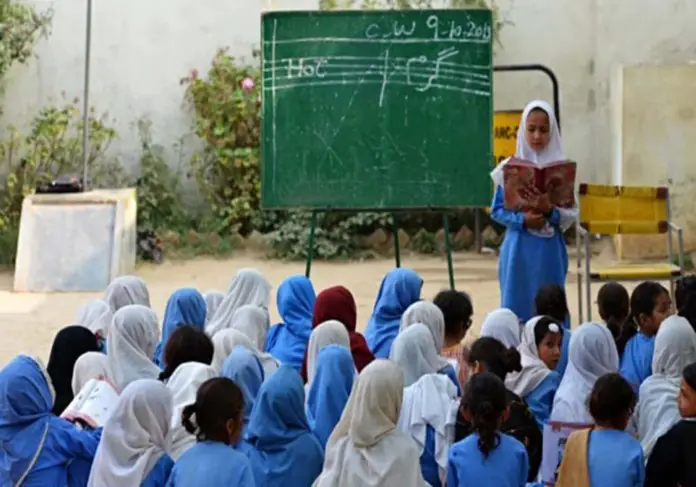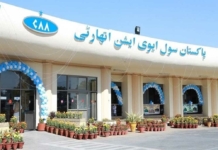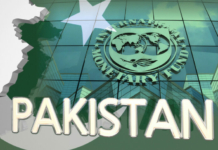Out of the Rs 3.22 trillion for the financial year 2022-23, the Punjab government has allocated almost Rs 485 billion for the education sector and claimed Rs 43 billion more than last year’s allocation, sources disclosed. A major chunk of Rs 428 billion has been earmarked for non-development expenditures while Rs 56.7 billion for the development side, such as the establishment of new schools, colleges and universities etc.
According to reports, Rs 421 billion are kept for the School Education Department, Rs 59 billion for Higher Education, Rs 1.5 billion for Special Education and Rs 3.5 billion for the Literacy Department. Moreover, Rs 5.5 billion will be utilized for scholarships for girl students, Rs 3.2 billion for the provision of free books to students, Rs 15 billion for improvement of facilities, Rs 3.7 billion for running expenses of Danish Schools, Rs 1.5 billion for the construction of new Danish Schools.
Meanwhile, as the sources disclosed, under the Public-Private Partnership Program allocation for Punjab Education Foundation (PEF) the Punjab government earmarked Rs 21.5 billion. Rs 4.8 billion will be spent on Punjab Education Initiatives Management Authority (PEIMA) for the outsourcing of public schools, Rs 1.5 billion for restoration of dilapidated buildings and Rs one billion for the construction of additional classrooms. The Punjab government will also spend Rs 1 billion each for the distribution of laptops among students and for the establishment of the University of Chakwal.
It is to be recalled that the federating units have to receive 17 percent more from the federal divisible pool. Punjab is to get the lion’s share of about Rs 2 trillion as the population matters the most. Muhammad Afzal, an educator said that the education system, economy, democracy, political stability and prosperity are directly proportional to each other. The countries that face problems like sectarianism, terrorism, and poverty insecurity reflect that they have a flawed education system. This type of ineffective education system becomes a major reason for lack of tolerance and want of general awareness in the society.
Why has the education system badly failed to raise the nation politically, socially and economically since its inception, he questioned. Ejaz Hussain Baloch, a teacher from Dar e Arqam Schools, Lahore, said that there are multiple reasons for this state of deterioration in the education sector. First of all the countries where political instability rules, little importance is given to education. Lack of an adequate budget is on the top of the list of reasons associated with a poor education system while lack of qualified teachers, outdated curriculum, poor management, lack of research, lack of supervision of the system and above all poor accountability are other reasons.
Baloch further said that all these lead to this counterproductive education system. As the founding father Muhammad Ali Jinnah had rightly reiterated that the main purpose of the education system of Pakistan would be to develop the national character of the new generation with social responsibility, selflessness, integrity, discipline and high moral values.
Moreover, our education system promotes rote learning instead of research-based and conceptual learning. The curriculum is also outdated that is not at par with the current practices of the world. The students study for more marks and ultimately to get good jobs in the market or the public sector, he held.
The examination system of the country is also one of the reasons for this poor quality education system because it tests the memory of the student. Moreover, there is also use of the unfair means in exams. There is no concept of proper supervision of the teachers. The in-place monitoring system in schools is usually used, as many teachers complain, for harassing them rather than guiding them for improvement.
Dr. Arshad Ali, Assitant Professor of Communication at University of Gujrat said that gross inconsistency in planning regarding education can be quoted as a harsh reason behind the failure of the education system. He said that a lack of political will gives space to bureaucrats to formulate educational policy. They usually ignore the main stakeholders ie teachers. He said that low literacy leads to people’s poor capability to judge political leaders. The higher the education level, the more democratic will be the system and society, he concluded.
Pakistan’s total public spending on the education sector is slightly more than 2% of the gross domestic product (GDP). The educationists recommend that the provincial governments should spend at least 5% of the GDP on education and research. After the 18th amendment provinces have more responsibility to put out-of-school children in educational institutions. Moreover, the government should allocate funds for the higher education of the aspirants enrolled in the world’s top-class universities in technical-scientific and skill-based education fields.
Vice-Chancellor, Punjab University of Technology, Rasul Prof Dr. Rauf-i-Azam, said that the recurring grant for higher education was stagnant which was around Rs 65 billion per year. He said that the development grant was around 45 billion. The rising inflation rate means there is around a 10% decrease in the education budget every year. 80% of the budget is spent on salaries while the rest of less than 20% is spent on development. This all leads to compromise on quality education. Society in the years to come may face further educational decline, he warned. He also pointed out that many public sector universities have not yet established and maintained their pension funds. They meet the needs of the recurring budget. He said that the need was to overhaul the overall education system.
Punjab University’s Professor of Geography and Head of Mountains Department Dr. Munawar Sabir said that the mushroom growth of private sector universities has occupied a large portion of the higher education side. He said that even in capitalist societies the governments have a say in the education system to save it from unbridled commercialization. He said that either the governments have to give interest-free loans to the students or administer free education for all, at least at the basic level.
The government besides earmarking a generous chunk of grants for the education sector should also evolve a long-term educational policy with the help of real-time data. The goals should be clearly defined with a plan to execute the policies in the best interest of the new generation, the society and the future of Pakistan.








Comments are closed.